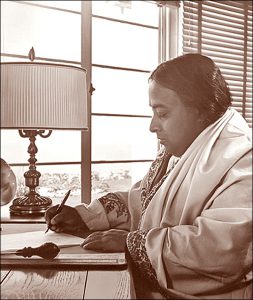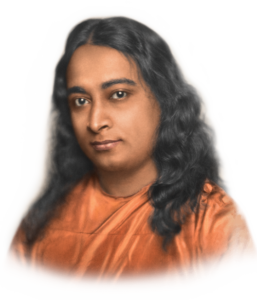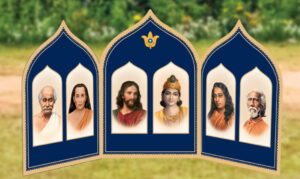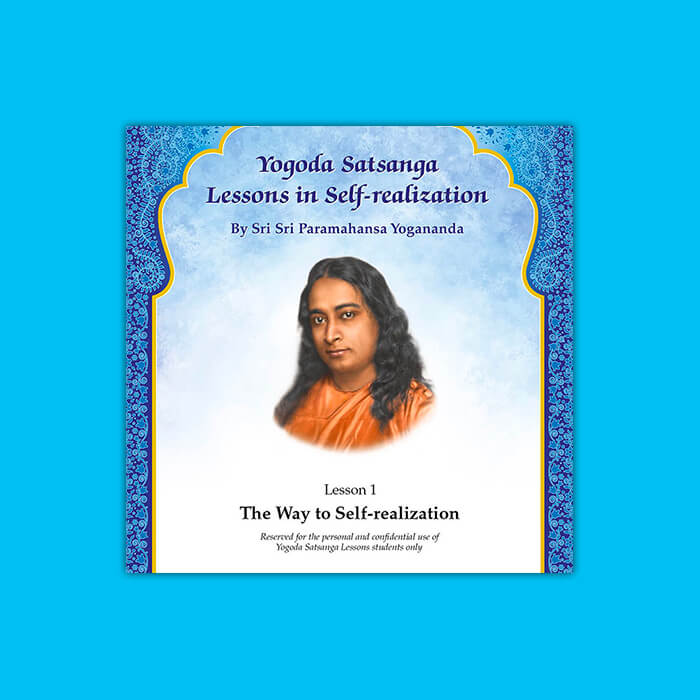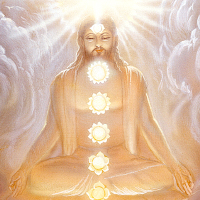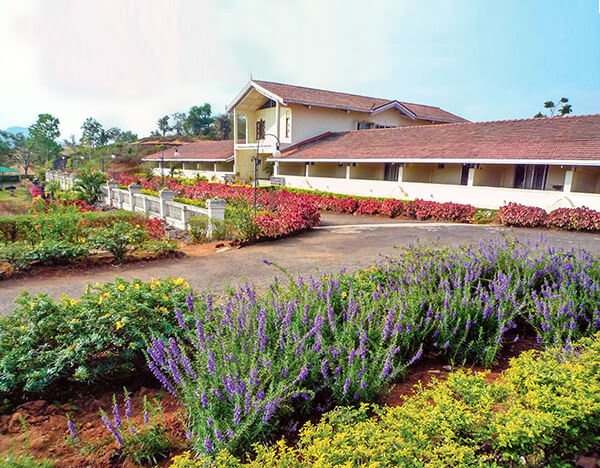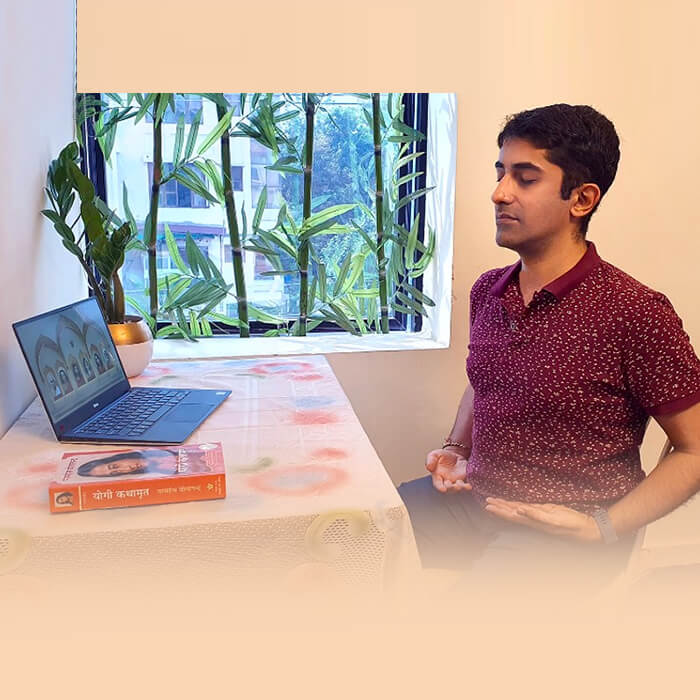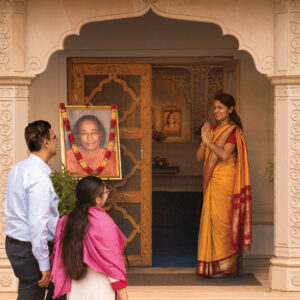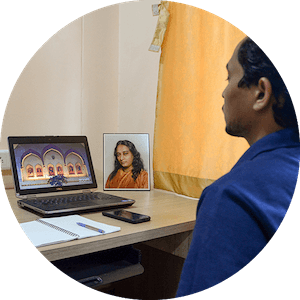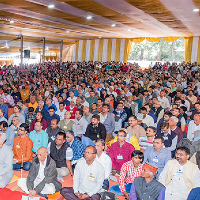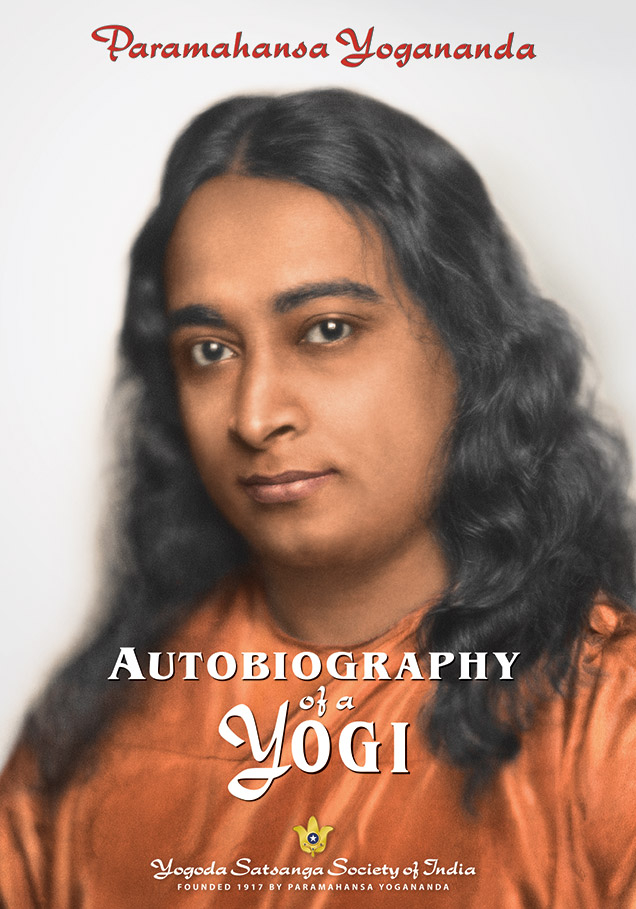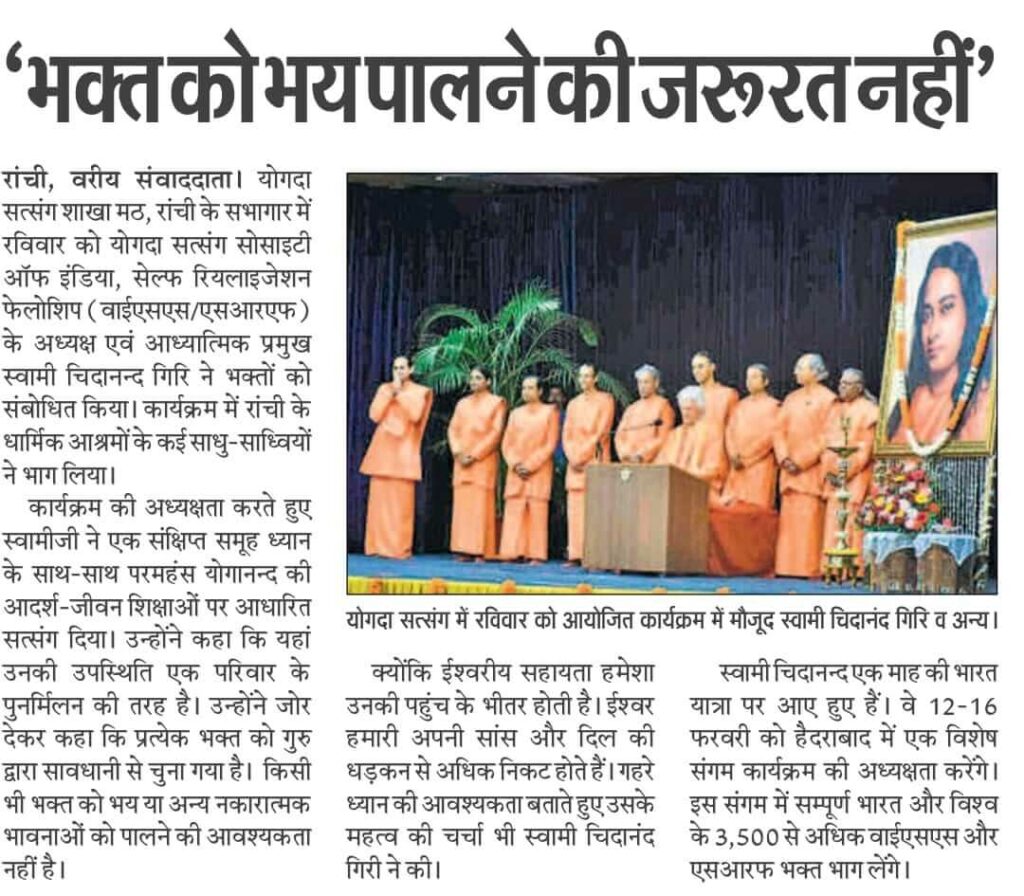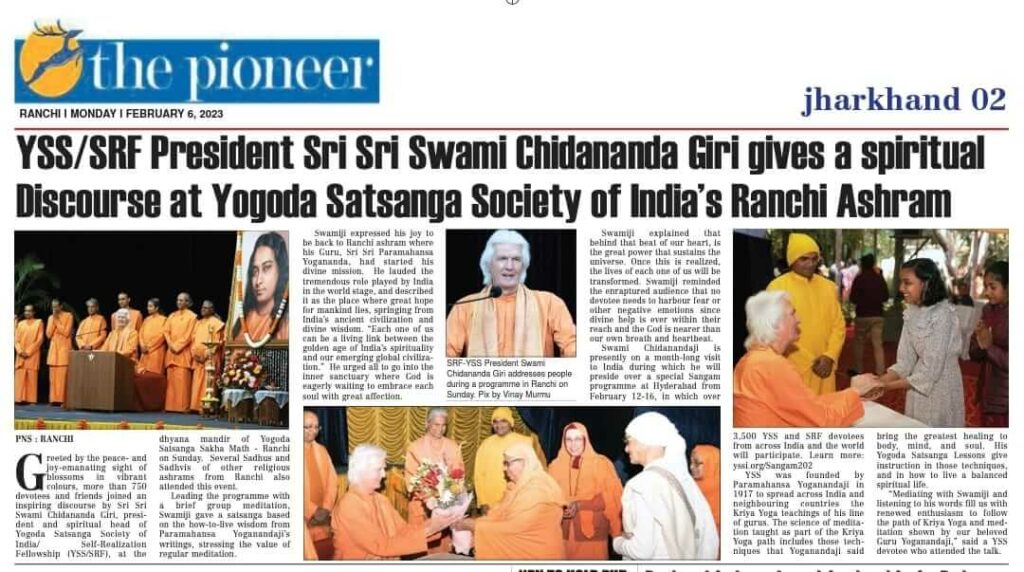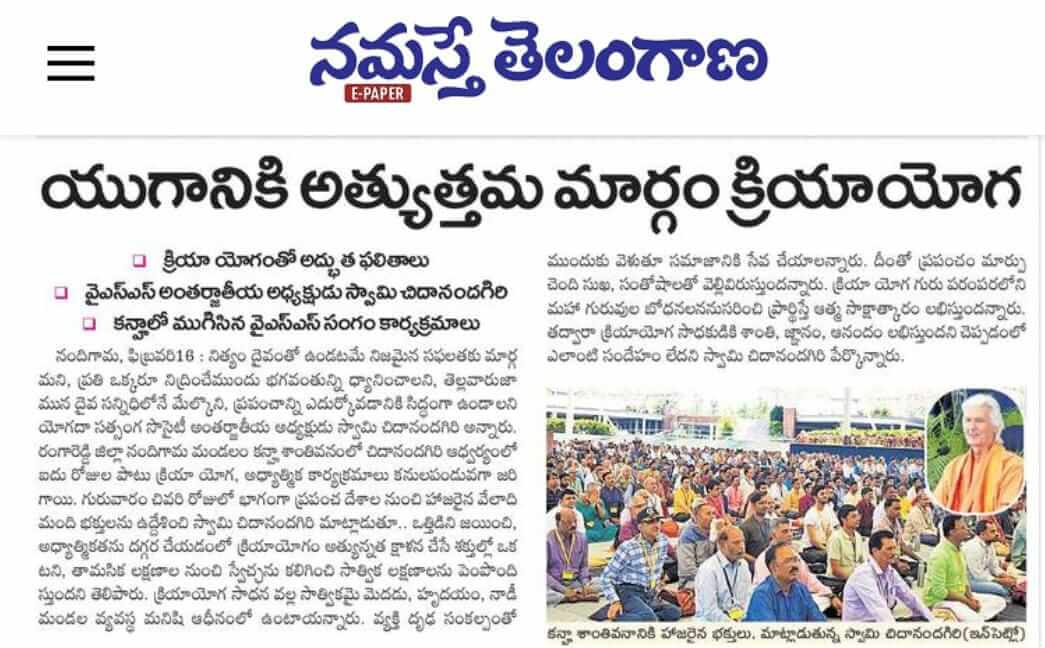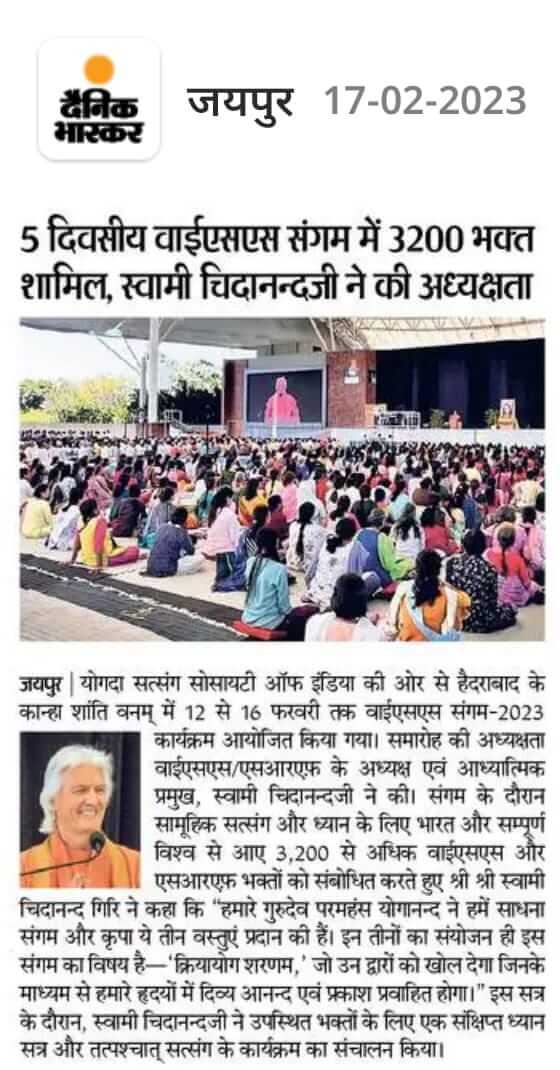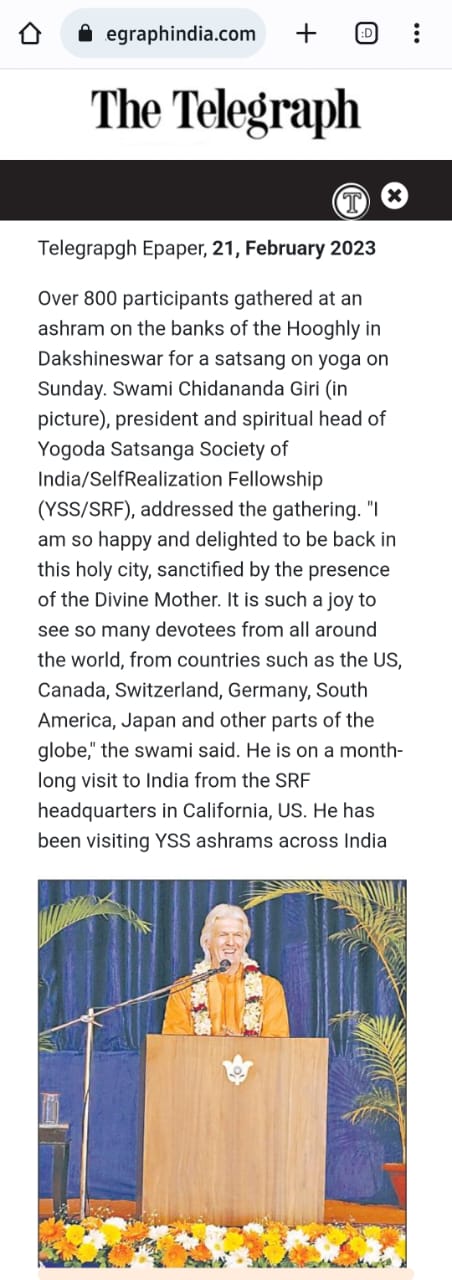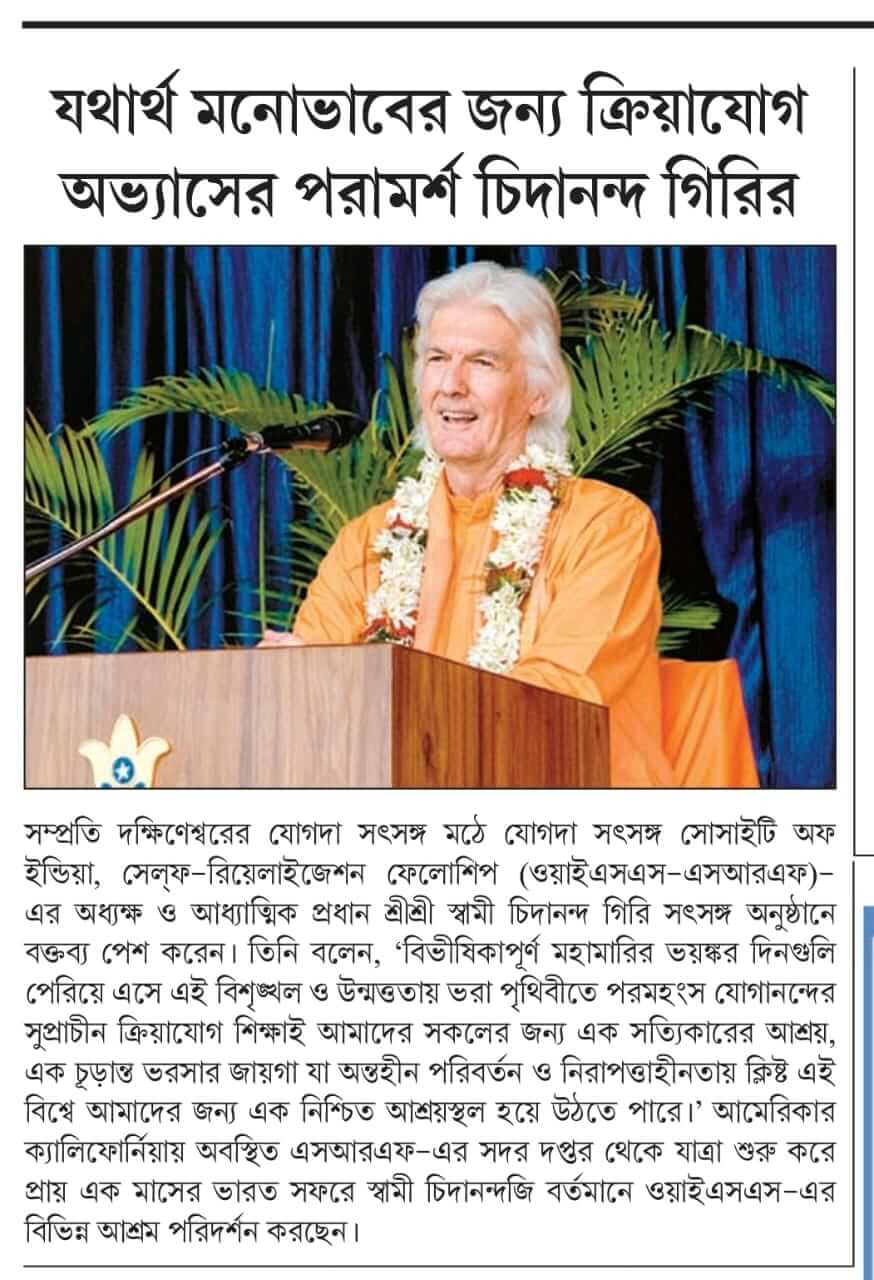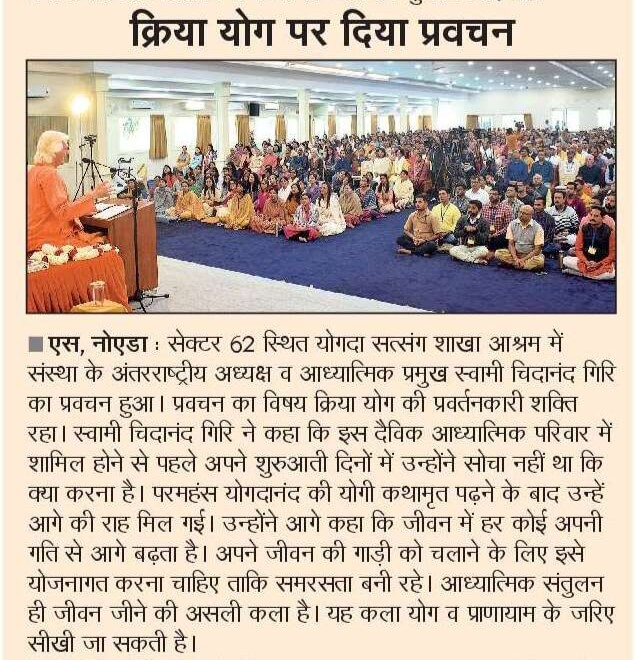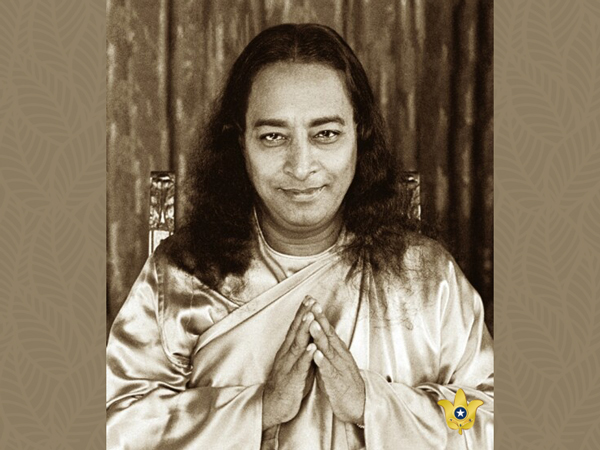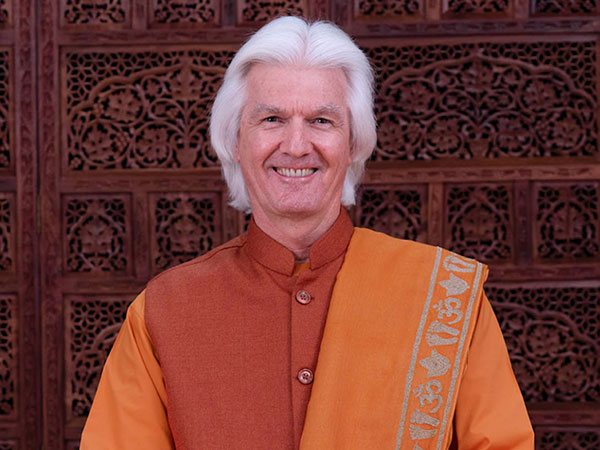
Sri Sri Swami Chidananda Giri, president and spiritual head of Yogoda Satsanga Society of India/Self-Realization Fellowship (YSS/SRF), recently visited India in February 2023. During this trip, Swamiji visited YSS ashrams located in Ranchi, Noida, and Dakshineshwar and also presided over YSS Sangam 2023 in Hyderabad.
Here are some highlights of the media coverage during Swamiji’s visit to India.
An Interview with Swami Chidanandaji — Sanskar TV
We invite you to watch an inspiring interview with Swami Chidananda Giri, president and spiritual head of YSS/SRF, that was recently broadcast by Sanskar TV. In this enlightening conversation, Swami Chidanandaji discusses the essence of yoga, its vital role in our fast-paced modern world, and the profound effectiveness of practising Kriya Yoga meditation in realizing the divinity within ourselves, and thereby recognizing it in everyone.
Chintan with Swami Chidanandaji — An Interview series published in The Pioneer
Swamiji was interviewed by an English newspaper, “The Pioneer,” on various important issues affecting different strata of society and the world. All articles (presented below) of the ten-part series have been published in The Pioneer.
Also, sometimes somebody recommends to us to read a book or listen to a particular motivational talk. Is it spiritual snobbery on the part of a devotee to not look at other paths, or not be interested in reading other spiritual books?
Swami Chidanandaji: No! It’s loyalty! And it depends really where one is on the path. When you’re in the phase of just exploring and comparing teachings then of course, it’s natural to “Oh! let us listen to that lecture and see if that makes sense, or this one makes more sense.” That’s fine. But, for Kriyaban disciples who have formed that relationship with the Guru, Yoganandaji has explicitly told us that the spiritual power comes through one channel only, and that is the channel of one’s God-ordained Guru.
Now, even that needs to be understood with balance and common sense. It doesn’t mean that you now have to be afraid of, or shun things. There is a lot of wonderful inspiration and encouragement that you can get from inspiring stories of other people, or scientific information that really helps to stimulate the mind, and which validates something that our Guru has taught. It’s just a matter of not taking other spiritual instructions or spiritual methods after you’ve accepted the sadhana of your own Guru.
First of all, as devotees of Yoganandaji, you are already reading the scriptures — the ‘Gita’; and for the Western world, it is the Gospel teachings of Christ. Those are two wonderful scriptures. We aren’t saying,“You give up reading the scriptures.” But is it necessary to read all the scriptures? No! Because Guruji has distilled everything that the devotee needs out of the scriptures, and put it into a practical programme of sadhana. Many people (and this is just the way of the world), read some scripture and then they think “OK, I’ve fulfilled my duty.” But that’s not going to get you what you want. You want consciousness of your soul, you want consciousness of your living dynamic relationship with God. You are not going to get that from reading a book, even a scripture.
So, there’s nothing wrong with reading scriptures. They’re wonderful, they have lots of inspirational material, and lots of eternally very useful principles of right behaviour and deep spiritual truths and so on. So, I would say it’s not necessary to read them, but there’s also nothing wrong with doing so, except for a devotee, if it’s done at the cost of spending more time on them than studying the YSS Lessons and actually meditating. Guruji has said that if you read for one hour then you write your reflections for twice that amount of time and think deeply about it for an even longer period. Of foremost importance is meditation. Reading books can continually inspire us, but in the end, inspiration is really worth very little if it isn’t put into practice.”
Question: “A saint is a sinner who never gave up,” Yoganandaji said. But, sometimes when a person first embarks on the spiritual path, they may harbour a feeling that they are not really cut out for it. As we are deeply entrenched in our own set of material habits and worldly ways, one may feel discouraged to embark on the spiritual journey thinking perhaps that, “Here are all these saints and I’m a sinner sitting among them!”
Swami Chidanandaji: This is a universal delusion that all human beings are subject to, especially people on the spiritual path. We all have a little bit of humility, and that humility wrongly-directed becomes low self-esteem or thinking ill of oneself.
But remember, once somebody asked Yoganandaji, what’s the most inspiring thing in the Autobiography of a Yogi and he said, “These words of my Guru Sri Yukteswarji: ‘Forget the past. The lives of all men are dark with many shames. Everything in future will improve if you are making a spiritual effort now.’” That’s a positive way to concentrate.
This may sound a little harsh but at a certain point when people keep on affirming to themselves, “everybody else is more advanced than me, and I’m the only one in the room who’s a complete failure on the path,” then in a way, that becomes almost an excuse for not making the effort. You have to confront that tendency in yourself and just order it, “STOP! I’m not listening to you! Get Out!”, just like you would if some crazy person was at your door, telling you, “Oh, you’re a terrible person, you’re no good.” Because, that’s exactly what’s going on.
You have these delusions that are latched on to the ego, and their number one objective is to prevent you from making a spiritual effort. Discouragement about yourself is usually the most effective way of preventing yourself from making a spiritual effort. So, you have to confront it, you have to be a “spiritual warrior.” Those are the Kaurava warriors that Paramahansa Yoganandaji writes about in Chapter I of his commentary on the Bhagavad Gita (God Talks With Arjuna) and that try to latch on to your thought processes and deflect you and deter you from standing up and asserting your victorious spiritual nature.
But it doesn’t come automatically. It takes will power, it takes determination, it takes an inner core of strength. But the worst thing that somebody can do is to keep repeating to themselves, “I’m no good, everybody else is better.” Just stop thinking that way, and take something that’s more positive from one of Guruji’s books, such as Where There is Light or Metaphysical Meditations. That’s why Guruji gave us those positive affirmations where he said, “I am a child of God, I am made in the image of God.” It takes work to uproot those delusions of wrong concepts about ourselves. And that work is done by meditation and by positive affirmation.
Question: “The simplest way to know God is the way of love,” says Yoganandaji. How is the path of meditation “the way of love?” Can yoga lead us to the experience of and expression of this “unconditional” love?
Swami Chidanandaji: “Yes! Yes! and Yes! Meditation makes us ultimately of all beings, because we feel the presence of God in ourselves, and then as that consciousness expands, we also become aware, first on a subconscious or subtle level and later on a more overt and conscious level, of that presence of God in other people. God is the most lovable being in the universe. If only everybody knew what God was… God is beauty, and joy, and happiness, and service-fullness, and all of those wonderful qualities that automatically command our respect and affection. So, the key to experiencing that love in oneself is to go to the source of love as Daya Mataji said over and over again. That was her whole life theme. She said, “I wanted love, I wanted to experience the love that was not flawed by human imperfections.” She said, “I made up my mind early on that I was going to go to God to find that love.” And how does one go to God? By meditation! Her whole book, Only Love, is about this.
Question: Swamiji, how can we counter sectarian violence and hatred?
Swami Chidanandaji: “Well, number one is to model and exemplify the kind of universality and understanding, and respect for other religious traditions that we find in our Guru’s (Yoganandaji’s) traditions and in our Guru’s teachings.
“It is a little bit of an ambitious project for individual devotees to feel that they’re going to all of a sudden stop sectarian violence on their own. This is an evolutionary thing. But each of us can contribute to that by – number one, modeling the type of respect and understanding and sharing with as many people as possible the different writings or books of our Guru that really focus on the underlying commonality among religions. For example, Guruji’s book: Science of Religion, certain chapters in Man’s Eternal Quest or other books like that, so that more and more of these ideas filter out into society. And then, of course, when one finds himself or herself in a situation where somebody is speaking in a degrading or derogatory way about followers of another path, and if there is an opportunity to respectfully and gently pushback, then just say that there’s enough hate in this world, and if it is really going to help to add even more to it. It is not like we have to become correctors and or disciplinarians of other people, but you can push back when somebody is behaving in that way around you. But most of all, the answer to that question is really a matter of more and more devotees living the life and living the universal outlook that we learn in the YSS Lessons. And you know, over time there’ll be an evolutionary change in society. But I wouldn’t encourage individual devotees to feel like they have to go out and directly confront sectarian violence, unless they have the means to do.
Question: Nearly 3200 devotees participated in the Sangam that was recently conducted at Hyderabad by YSS. What can the devotees do to carry home the blessings they received during the Sangam?
Swami Chidanandaji: My answer to that would be different from what it would have been three years ago and I will tell you why. Let’s just take the basic principle of satsanga — spiritual company.
Paramahansa Yoganandaji made such a point of it ‘Environment is stronger than willpower.’ We become like the company we keep. Even if we want to be successful in business or sports or whatever field, you become like the people you associate with. The group consciousness adds to our individual efforts. From the very beginning of Yoganandaji’s work, he emphasized that devotees should come together for group meditation once or twice a week. That is one way of keeping the satsanga.
The second thing evolved over the last two years when the Covid pandemic erupted and everybody had to stay at home as all the meditation centres and ashrams were in lockdown. Just a couple of months before the lockdown we had inaugurated an online meditation centre, using video conferencing, in which devotees could come together online and have group meditations and group satsangas. That turned out to be a real lifesaver for devotees all over the world during these three years of isolation. Now there is a tremendous potential for using that technology for satsanga, using that power to create the right environment, even if you do not go out of your home.
The third thing is this….“Once you form a deep spiritual relationship with an enlightened being such as Paramahansa Yogananda, you never meditate alone because the devotee’s efforts are always reinforced by the help of the Guru, who introduces the devotee to the Divine. In one way that is the most valuable form of satsanga — satsanga with the Guru – because it is totally available regardless of outer circumstances – whether I am near a meditation centre, in front of a computer, no matter what.”
“I always have here (pointing to the kutastha centre), this sacred refuge, the sanctuary of the soul, that satsanga that exists between the devotee and his Guru is never for an instant missing. It is always there.”
Question: Swamiji, would you have any tips for the youth to achieve real success?
Swami Chidanandaji: “First of all, realise that I have a body, I have a mind but I am the atman — a soul. Real success means organising one’s life and one’s goals by giving the right amount of time for each of those. You can’t ignore the material, and you can’t ignore the intellectual development and educational development and you certainly cannot ignore the development of spiritual consciousness.
“Real success comes from adopting a way of life that gives time to each one of those. That is exactly what you find in the Yogoda Satsanga Lessons. The whole road map for balanced living: for the health of the body, the efficiency of the mind, in education and cultivation of the intellect and the rational qualities is all very important.
“And learning to meditate and take a little time. 10 minutes may be in the morning and 10 minutes in the evening. (That’s not really fair in a way because once they do it for 10 minutes, they will want to do it for 20 minutes, and once they do 20 minutes, they would want to do it longer…that’s how meditation works!)
“But the point is…to be successful you have to build a plan for life…nobody is going to be successful by waiting for it to happen. You have to structure the 24 hours we each have in a day. You have to look at that and consciously take control of your time and consciously use your time for the aspirations that you have.”
Question: How can we interest children in Paramahansa Yoganandaji’s yoga-meditation teachings? Do YSS and SRF have literature to introduce children to meditation?
Swami Chidanandaji: “Parents can introduce children to the teachings by being happy, by being fulfilled and by being the model of the qualities that they want to see in their children. You cannot say to children, ‘Do as I say, not as I do.’ That never works. On the other hand, the one who says nothing but lives in a way that embodies kindness, dignity, and respect for others and self-determination, ‘my life definitely is what I make of it,’ makes an impression on his children.
“…Parents have to be the example for their children who are, by their very nature, always in a learning mode. Their brains and nerves are switched in high gear to learn and absorb in those earliest years. The mind of a child is so plastic, so malleable and so able to be moulded in either negative or positive directions. I feel very strongly about this because there hasn’t been enough emphasis in today’s world on the responsibilities of the parents. If you are going to bring a child into this world, you have to be responsible for it. It does not mean that you have to buy all the latest video games, clothes, this fashion and that kind of gadget and so on. No, you have to be the kind of person that your child can look up to.”
The Situation that Women are in today Is A Transitional Phase
Question: In India (and perhaps globally as well), the mother is usually at the centre of the household – juggling family, household duties, work, and expectations of all kinds. How can women follow the routine of twice-daily meditation prescribed by Yoganandaji without compromising on their multiple responsibilities and without disturbing harmony in their homes?
Swami Chidanandaji: “That is quite a duty list, isn’t it? Let me say one thing to put this into context. The situation that women are in today in India and other more developed nations around the world is a transitional phase. Ladies being asked to do so much comes from a generation where women were more stifled and pigeon-holed into ‘You just stay home and do the cooking and cleaning’ and all that. That’s barbaric and primitive. At the same time, we are in the sort of intermediate stage where women, rightfully so, are able to explore other avenues for their personal development and their own unfolding of personal interests. But the real life of a spiritual balance would be an appreciation of a balanced role for men and women, creating a life of harmony in the home and in the business world.”
“I totally understand and I don’t know how women put up with it. In general, women are stronger than men, because they have to bear so much of the responsibilities. Women need not think that they have to “have it all” – be a corporate executive with two or three super-achieving children, two to three nice big houses, a perfect body, perfect health, and so on. These are a set of tensions which are not sustainable, and unfortunately society at large is still going through a discovery process to find the right balance. But we do not know how to get there yet, and what you are describing is this situation that has to be endured until it is outgrown. The sooner we outgrow it the better.”
Question: Swamiji, what role do you feel India’s spirituality can play in the growing global spiritual civilization?
Swami Chidanandaji: “This is something very dear to my heart as it was to our guru Paramahansa Yogananda, and to one of the core missions that he was sent to accomplish. Talking about India’s spirituality, let us go back to that Golden Age of civilization from which the Gita, the Yoga Sutras and the Upanishads came. Here, you find this truly universal teaching which is not speaking to a member of this religion or that religion, or to a member of one ethnicity alone, it’s talking to that human condition all around the globe. That’s why you have these beautiful statements in the Upanishads that ‘the world is one family’ [‘Vasudhaiva Kutumbakam’], and ‘truth is one, even though the rishis call it by many names’ [‘Ekam Sat, Vipra Bahudhaa Vadanti’].
“The ideal religion should be: ‘May all beings be happy’, may all beings be free of suffering.’ It doesn’t say, ‘may all Indians be happy,’ or ‘may all Hindus be happy but not the Muslims or the Christians’ and so on, because all of us have that spark of the same one God within each one of us. This is part of the evolutionary process that we’ve come to see: that we recognize each other as brothers and sisters or we destroy each other and the plan along with it.
“The World Looks to India with Such Admiration”
“In terms of the role of India, the greatest thing that India can offer to the world is to model and exemplify India’s own divine and eternal heritage because the world looks to India with such admiration. You may not know that if you haven’t been to the West, but as a person growing up in a generation where many people had perhaps either read the Autobiography of a Yogi or attended a programme by one of the spiritual teachers that came from India to the U.S., this is how the world looks at India. And the same is true for Europe, Australia and South America. Millions of people revere India almost like the big brother of humanity, spiritually speaking.
“No question that the global spiritual civilization is happening in two ways — one is the material way — through technology, communication and travel. When you look back a couple of generations before, to travel from U.S. to India was huge and for many people it was impossible. But now people can just get on a plane to visit Bangalore or Chicago. So, the world has shrunk. It is no longer this diverse collection of individual nations and cultures.
“The internet has really transformed the fabric of human society. It’s really become like a nervous system that unites the one body of the human family. What happens is that when you bring people closer together, you better get along with each other. It is like you have in a family, where you have them living in the same house. Unfortunately, you have seen family members who are biting at each other and so on. Well, if the human race does that then it won’t last more than a few generations.
“We have a capacity for mass destruction, which did not exist a hundred years ago. Along with that increase in technical power and the shrinking of the world, we are literally in one household, more than ever before in recorded history. Then we have to have a similar degree of ‘spiritually growing up,’ a spiritual maturity where we have self-control, where we are not just trying to avoid the people we do not like. We have to have the spiritual maturity to know that as I have a drive for happiness and security, peace and success, so do all those other human beings. And eventually people come to see that ‘I am not truly happy unless those around me are happy.’ You can’t just push them off and say that’s over in that country or that’s over in that country because that, as a whole, impacts the world. Look what happened with Russia and Ukraine. A hundred years ago, it would have been two neighbouring countries going at each other. And now everybody from Prime Minister Modi to President Biden and everybody in between said this is not how we do things in the 21st century. Spirituality has to develop parallelly, along with material technology.”
Question: How do people make time for meditation in their busy lives?
Swami Chidanandaji: “As the world is getting more and more complicated, and more and more driven in that material sense, people are realizing that meditation is a survival skill. You will be shredded if you don’t have access to that kind of well or fountain of inner peace. That’s what meditation brings to us.
“In terms of what will motivate people and how do they find time, you might just ask them how do they find time to sleep, how they find time to eat, how do they find time to do any of these things? Because you accept it as a necessity. The more society is getting crazier and crazier, more and more people have realized in the West: in Europe, in the U.S., South America, Australia, and certainly, in India, they are realizing that ‘if I’m going to retain even my grip on my humanity and my sanity, I have to learn to contact that soul awareness.’”
MEDITATION: TRY IT AND COMPARE!
Question: Today’s society teaches the youth that indulging in the senses is the only way to enjoy life, whereas meditation and yoga teach the opposite – that self-control and interiorization is the way to happiness. Do Yoganandaji’s teachings resolve this dilemma?
Swami Chidanandaji: “Paramahansa Yogananda always said, ‘Try it and compare.’ In the course of a soul’s evolution over incarnations, every single human being will come to the point where he thinks: ‘Satisfying the senses will leave me unsatisfied because I’m not the senses.’ We have all gone through it, and we are not being critical of people who may be pursuing sex or wine or riches etc. When somebody embarks on a serious commitment to the spiritual path, it is because they have done all that and, in the end, it has left them all empty.
“On the other hand, it’s very hard to convince somebody who hasn’t come to that point. You can’t lecture someone and say: ‘Don’t do that, that’s bad for you.’ Just like when you were a kid and your mom tells you something like that, and as soon as she turns her back, you want to do it. That’s not going to work. It has to be: ‘Try the meditation, and then compare.’
HIGHEST LEVELS OF SELF-REALIZATION
Question: Where does one start?
Swami Chidanandaji: “We give them a book by Paramahansa Yoganandaji — ‘Autobiography of a Yogi,’ or ‘Where there is light’, something that gives them a little entry point. Then we encourage them to read the introduction to the marvellous Yogoda Satsanga Lessons in Self-realization that our guru Paramahansa Yoganandaji left us. The introduction to it is called ‘Highest Levels of Self-realization.’ So even in the title, it says, ‘Do you want to make something of your life? Then take a look at it and see what you feel.’ The YSS Lessons give instructions in forming a daily routine of meditation and give the techniques over a period of some months, and after nine to ten months, you have a full toolkit to make yourself a real meditator.”
Question: Swamiji, in his teachings, does Yoganandaji specify or mention a path, a person or a youngster has to follow to achieve success? What does the teaching interpret in terms of human beings achieving success? Can Yoganandaji’s teachings help the youth achieve success in their life?
Swami Chidanandaji: “As human beings, we are hardwired for success. But, one has to know how to operate those faculties, those instruments. And that’s what his (Paramahansa Yoganandaji’s) teachings bring out. The very basis for it all is the concept of balance, which means we have a material aspect to our nature: we have a body, we have to feed it, we have to take care of it when it gets sick, we have to find a way to heal it…and all those issues having to do with the material side of life. But the thing is that a lot of humanity just stops there.
“Even more important is that we have a psychological, emotional and even higher than that, the spiritual dimension to our being. So his (Yoganandaji’s) path to success was to find the right balance where you find material success and prosperity, where you have emotional poise and inner peace, and most of all, spiritually, you have the wisdom to direct your life according to a higher purpose — not just making money, not just having family and children, but a higher purpose of realizing I’m a spark of the Divine being, I’m this atman who is living in this material body and my ultimate purpose is to have complete realization and expression in all aspects of my life.”
Swamiji added: “Now, once you have that concept, life becomes so exciting because you have access to a whole set of skills and faculties and abilities that are part of the endowment of every human being, but they are completely dormant until they are awakened by conscious attention and conscious effort. And that is what the teaching of Yoganandaji gives. He says that by meditation, by developing will power, by developing concentration, by developing all of these qualities that make up a complete human being, you can find the highest material success, psychological and emotional health and balance, and most of all, spiritual health.
“When he came in the 1920s to the United States, this phase in the history of the U.S. was called the ‘roaring twenties’ because U.S. was completely gung ho, and was forging ahead with its philosophy of capitalism. He met many successful business people, heads of industrial concerns etc., and they all recognized that Yoganandaji brought the one thing that was missing in their lives.
“I’ll tell you a fun little story: When he was giving lectures in New York City one man asked to have an interview with him. He came to his hotel room and before Yoganandaji really could say anything, he said in a challenging manner, ‘I’m disgustingly wealthy, I’m disgustingly healthy,’ meaning, ‘What are you here for?’ and Yoganandaji immediately said, ‘Yes, but are you disgustingly Happy?’
Later that man said, ‘He got me!’ And he became a Kriya Yogi for the rest of his life. Outwardly, a multimillionaire industrialist, inwardly, he was an illumined yogi.”
Question: Swamiji, in your opinion, how do you think Paramahansa Yoganandaji’s teachings would impact youngsters today?
Swami Chidanandaji: “When you understand that human beings are essentially souls, you can’t just look at one little incarnation. Who we call ‘young people’ are old souls and they have gone through every form of striving and aspiration to fulfil drives that are innate to every human being — the drive for happiness, for security, for love and so on. They have spent many incarnations trying to find that [fulfillment], and eventually they’ve come. And among those that have incarnated, we have millions who are at that stage of evolution from past incarnations.
“In the Bhagavad Gita, Krishna talks about it. He says to Arjuna: ‘Don’t be worried if you reach the end of this incarnation without having attained the final goal, because no effort in yoga meditation goes waste.’ That devotee then is reborn in an environment where he or she just picks it up again. So, those whom you are calling ‘young people,’ are wise, probably somewhat embattled souls who have been through everything, with a ‘been there, done that’ sort of consciousness. And they come back and they say, ‘I’m not wasting time any more, I’m not wasting any more incarnations, and I will go for what will truly fulfil my soul’s potential and the cravings for that divine contact that are there in my soul.’
“Just as all life evolves in an upward pattern, human beings also evolve from basic human endowments to higher states of evolution, and bring out more and more of their potential lifetime after lifetime. Humanity as a whole goes through the cycles of evolution and devolution called the yugas in the scriptures. They go up and down; right now, we are in a yuga that is going up. In other words, the souls that are coming into incarnation now are coming at a higher state of evolution than their grandparents and great-grandparents. … Look at the children today; there is this natural sense of… ‘No, I’m not going to harbour hatred of somebody just because of the colour of their skin,’ and their natural rejection of other kinds of human ignorance that were so entrenched in the past generations in all countries around the world.
“It is almost as if they come with a little bit of advance preparation, and as soon as they get exposed to this concept of meditation [given by Paramahansa Yogananda], this path based on universal spiritual principles, which has nothing to do with ‘my religion against your religion,’ but is a universal path that unites the human family rather than divides it, it makes complete sense to them because that’s where they are on the evolutionary ladder. I think you’ll see this probably a lot more when you are my age. You will look back and say, ‘Oh, how could people have been like that back in those generations?’”
Interview with Doordarshan India
We invite you to watch an interview with Swamiji conducted by DD News wherein he shares how essential meditation and universal spirituality are to facing with equanimity whatever difficulties the world may be going through, and to discovering our own native inner divine qualities.
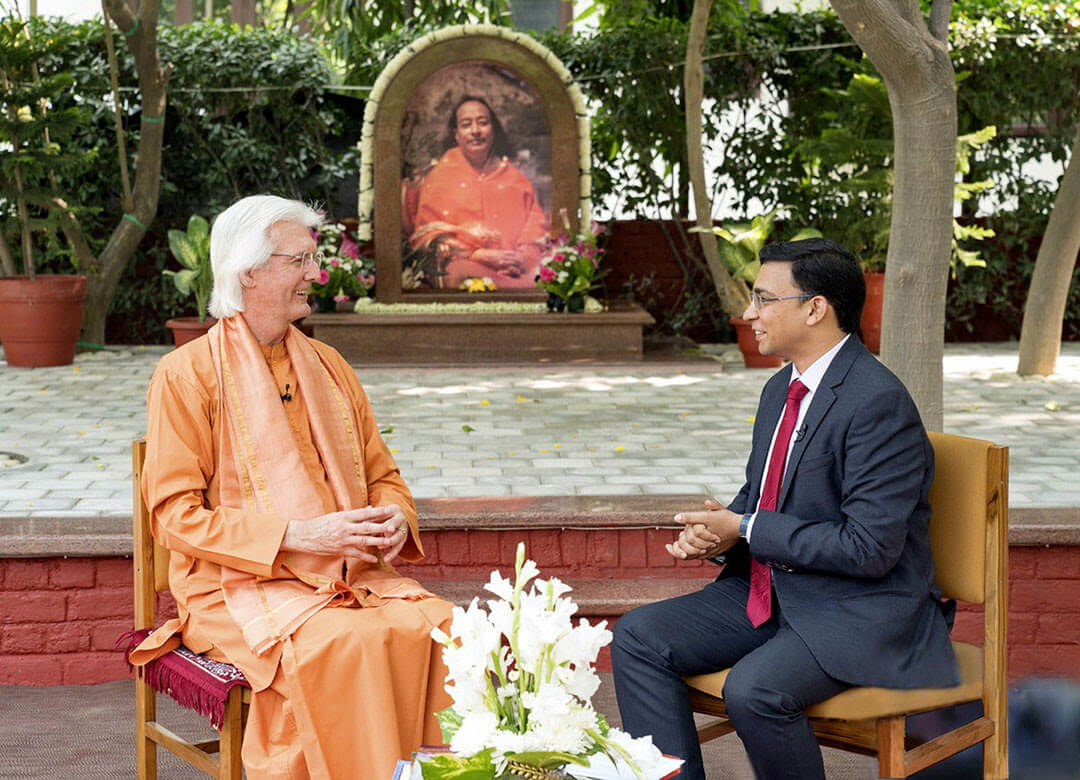
We would like to share with you some of the press coverage that took place during Swami Chidanandaji’s visit to YSS ashrams in Ranchi, Noida, and Dakshineshwar. Additionally, Swamiji’s visit to Hyderabad for YSS Sangam 2023 was also extensively covered by the press.
Ranchi
Hyderabad
Please click the button below to view photos of Swamiji’s visit to different parts of India.



